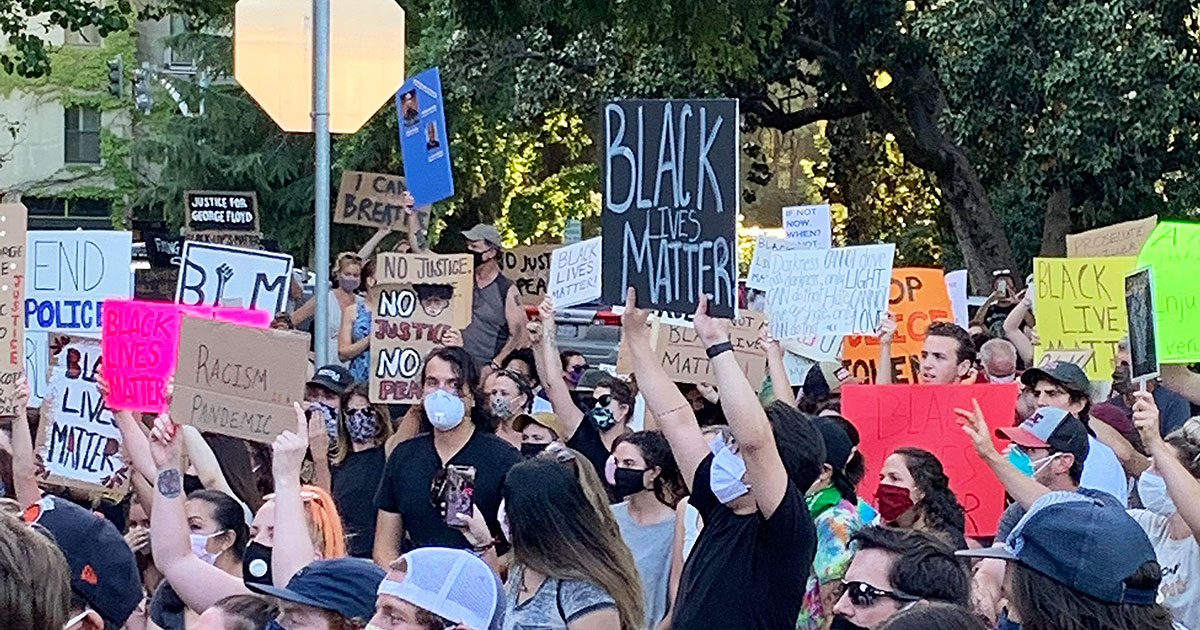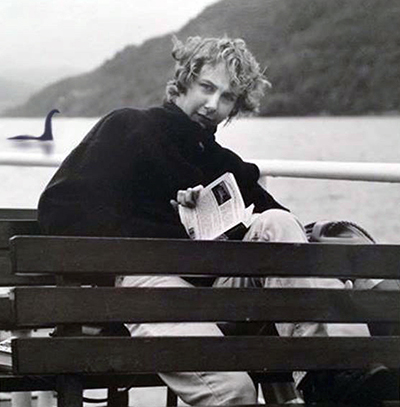SPOTLIGHT
★ ★ ★ ★
IT’S NOW OR NEVER

By Maria Behan
It has taken us long enough, but white people finally seem to be getting it. By “it,” I mean the fact that racism isn’t just something that warps certain individuals, it warps entire societies, with consequences as widespread as they are devastating.
That shouldn’t be news here in America, a country where the ground we stand on was taken from the indigenous population by European settlers who had few qualms about uprooting and murdering people they saw as less human than themselves. In many places, the land those settlers seized was then worked by people who themselves had been seized, slaves brought from Africa under conditions of unimaginable brutality to live and die in a New World of unimaginable brutality.
Another “it” that many white people all over the world are waking up to is the fact that racism isn’t just the problem of people of color trying to stay afloat or even merely alive in white-dominated societies. It’s our damn problem because our forebears created the system—and wittingly or not, we continue to both contribute to and benefit from that system. Since “our kind” are the perpetrators, we have the responsibility and hopefully, the agency, that will help us to fix it.
British artist Banksy came up with a brilliant analogy after George Floyd’s life was snuffed out by a cop’s knee. He compared “the white system” to “a broken pipe flooding the apartment of the people living downstairs. This faulty system is making their life a misery, but it’s not their job to fix it. They can’t—no one will let them in the apartment upstairs. This is a white problem. And if white people don’t fix it, someone will have to come upstairs and kick the door in.”
Hearteningly, it seems that wide swaths of white society are finally seeing systemic racism as the many-headed hydra it is and are stepping forward to join people of color in the hard and messy work of trying to slay the beast. These whites include progressive activists who’ve long considered themselves allies in the struggle for racial justice, but who are now seeing that struggle in a new, and sometimes painfully illuminating, light. They also are white people who’ve been less engaged but are realizing that not only is the struggle for racial justice real, it’s a fight they must join.
Acknowledging and dismantling white privilege won’t be easy, even for whites who earnestly want to learn from the past, face up to the innumerable uncomfortable truths about the present, and strive to build a future that’s more equitable and just. As the group traditionally calling the shots, it’s unsettling to let others lead, educate, and set the tone. It requires not just open-mindedness, but humility. Neither of which have been hallmarks of white society.
Besides changing notions of hierarchy, we also have to grapple with changes in language. The terminology of race, sex, and preference is ever-evolving and often awkward. Speaking personally, new terms, like Latinx (a gender-neutral replacement for Latino/Latina that feels more inclusive for many, especially those in gay and transgender communities) and BIPOC (an acronym for black, indigenous, and people of color) get tangled on my tongue and sometimes leave me ambivalent. To me, Latinx is an elegant nod to gender, sexual, and identity equality; but BIPOC sounds like clunky virtue-signaling that seems to privilege some minority groups while lumping others together.
But you know what? It’s not up to me to name those and other groups. Calling folks (which some say we should now call folx) what they want us to call them is pretty much literally the least we can do.
Rural America Gets Woke
I live in a town you might think of as bucolic: a conclave of about 12,000 people nestled in Northern California wine country. But all our natural beauty and rustic charm can’t hide the fact that fine wine and fancy farm-to-table food has hidden costs that run deeper than the sometimes outrageous price tags in our tasting rooms and restaurants. Costs in terms of labor and prejudice and health and income inequity. Costs that in this neck of the woods, are borne mainly not by black, but by brown bodies.
Our town is about 30 percent Latinx, but you probably wouldn’t know that from walking around the central square, which is populated by ritzy boutiques, tasting rooms, and restaurants that attract affluent folks from the Bay Area and around the world. Until recently, many white residents like me weren’t aware that our Latinx population was so large. Not because we “don’t see color,” as Stephen Colbert’s faux pundit used to pompously bleat on The Colbert Report. But because many of the brown people in our community aren’t as visible as their white counterparts.
Instead of swanning around tasting rooms and art galleries, they’re working in the vineyards, farms, restaurants, and hotels that are the lifeblood of our local economy. Some of them keep a low profile because of their immigration status. Others do so because of the systemic racism that leaves them more likely to be subject to police stops, or to neighbors asking them where they’re from even though they were born and lived their entire lives here.
Those and other stories came out in a flood this month in conjunction with a planned event to honor the memory of George Floyd with a peaceful gathering calling for racial justice. But that vigil, initiated by older and whiter folks like me, was cancelled due to extraordinary pressure from local merchants and officials worried about looting and unrest.
Some of that concern may have been understandable, but it quickly escalated to absurd levels. Social media buzzed with talk of “busloads from Oakland” (code for black people) coming our way. Heaven forbid: actual black people ruining everything by coming to our Black Lives Matter gathering!
The local police department also had to issue a statement saying that despite rampant rumors, they had NOT discovered a truck full of vandal-friendly bricks in a local supermarket parking lot.
After days of pressure and a sleepless night, the vigil’s organizer took to social media to cancel the gathering. But those who wanted to gather would not allow themselves to be cancelled. As one of them wrote on Facebook, “Cancelling the vigil makes white folks feel safer and makes people of color feel less safe.” The march went ahead.
Despite the hysteria, neither Black Panthers nor Antifa wreaked havoc in our little town. Instead, it was about 600 people—the most I’ve ever seen at a demonstration here—mostly young and passionate and way more diverse than the Sunday brunch crowd. It was a thing of beauty, and it also proved hugely consequential as a way of jarring our sleepy burg into reckoning with the moment we’re in. The mayor, who’d dismissed concerns about local policing, resigned in response to widespread local outcry. The police chief announced that he’d fill two vacant slots on his force with social workers instead of cops. And at least one young person of color has thrown his hat in the ring to join our city council.
The Melting Pot and Other American Myths
So far (and I have a long way to go), the most uncomfortable part of being white and facing up to the almost unimaginably vast reaches of racism is the way it recasts the story of my own family. Like many children and grandchildren of recent immigrants, I was relieved that my family seemed unsullied by the shame of the slave trade, and I took pride in how my scrappy Italian and Irish forebears came to America in the early 20th century with next to nothing and eventually reached the middle class. But now that I examine that history more closely, I realize it wasn’t all just hard work. It was also the New Deal and G.I. Bill programs that were doled out far more generously to white citizens than black ones. It was innumerable instances of getting opportunities or simply the benefit of the doubt for no other reason than the color of their skin. And the naive pride that they and I took in their ability to “pull themselves up by the bootstraps” is part of an ugly myth that distorts reality and blames victims for the injustices foisted upon them.
I’ve got plenty of work to do, and whatever your race, if you want to see real change come now after it’s failed to materialize so many times before, you’ve got work to do, too. Racism deforms both our characters and our societies. If we ever manage to rid ourselves of it, perhaps we will truly be free at last.

Maria Behan writes fiction and non-fiction. Her work has appeared in publications such as The Stinging Fly, Huffington Post, The Irish Times, DailyKos and Northern California Best Places.
























You’ve woven together so many interesting and important points from language to history to local actions. Beautifully done. This leaves me hopeful that we can work on this successfully.
Beautiful Maria Behan! Yes, we have work yet to do/
Your writing captures so beautifully many of my thoughts on racism, white privilege, the hidden ways we contribute to the systems that have been in place that keep some down and some up. Thank you for taking the time to compose your ideas and share with a wider audience. I appreciate it and will pass along to others, like me, who are open and willing to learn and be better.
Loved, “Heaven forbid: actual black people ruining everything by coming to our Black Lives Matter gathering!”
Also love the Bansky metaphor.
An update on the changes happening in my little town, https://www.pressdemocrat.com/article/news/healdsburg-city-council-appoints-first-latino-in-nearly-3-decades-to-vacate/?sba=AAS